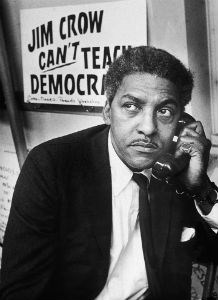
Human Rights Campaign
Bayard Rustin was a brilliant strategist, pacifist, and forward-thinking civil rights activist during the middle of the 20th century. In 1947 as a member of the Fellowship of Reconciliation, Rustin planned the "Journey of Reconciliation", which would be used as a model for the Freedom Rides of the 1960's. He served as a mentor to Martin Luther King, Jr. in the practice of nonviolent civil resistance, and was an intellectual and organizational force behind the burgeoning civil rights movement during the 1950s and 1960s. He organized protests in England and studied Ghandian principles in India. His life as an openly gay man, however, put him at odds with the cultural norms of the larger society and left him either working behind the scenes or outside of the movement for stretches of time.
Born 1912 in West Chester, Pennsylvania, Rustin was raised a Quaker and his family was engaged in civil rights activism. He attended Wilberforce University, Cheney State Teachers College, and City College of New York. A charismatic man, he earned a living as a spiritual singer in nightclubs while living in New York City. He took a brief interest in the Communist movement and was a life-long pacifist, due to his Quaker upbringing. His commitment to civil and human rights came at a personal cost. He was arrested multiple times and twice went to jail.
In the 1940s he met A. Philip Randolph and worked with him on various proposed marches on Washington, D.C. to protest segregation in the armed forces and the defense industry. Because of their experiences together, when Randolph was name to head the March on Washington for Jobs and Freedom in 1963, he appointed Rustin as Deputy Director and overall logistical planner. In 1947, Rustin and George Houser, executive secretary of CORE, organized the Journey of Reconciliation which was the first of the Freedom Rides. The Rides were intended to test the U.S. Supreme Court's ban on racial discrimination in interstate travel. Rustin was arrested for violating state laws regarding segregated seating on public transportation and served twenty-two days on a chain gang.
With the passage of the Civil Rights Act of 1964 and the Voting Rights Act of 1965, his talents and tireless work were transferred to human rights and the gay rights movement. In the 1970s and 1980s he worked as a human rights and election monitor for Freedom House and also testified on behalf of New York State's Gay Rights Bill. Bayard Rustin died from a ruptured appendix on August 24, 1987 at the age of 75.
Last updated: November 20, 2023
